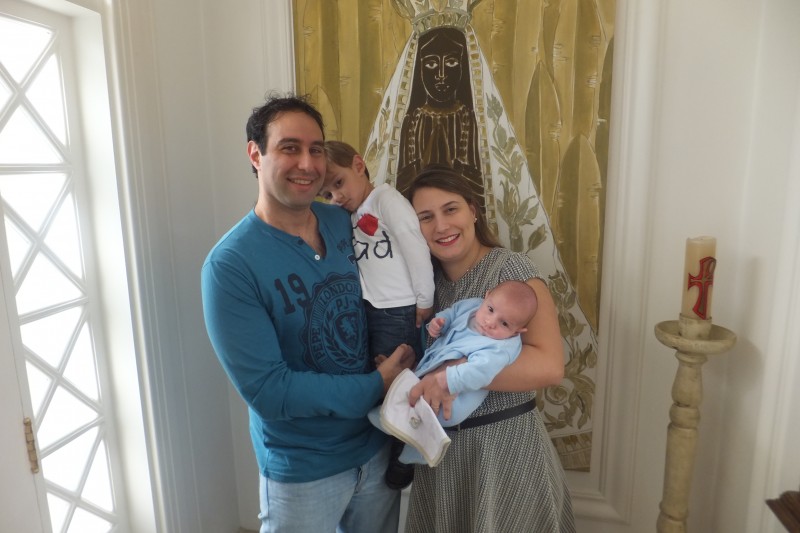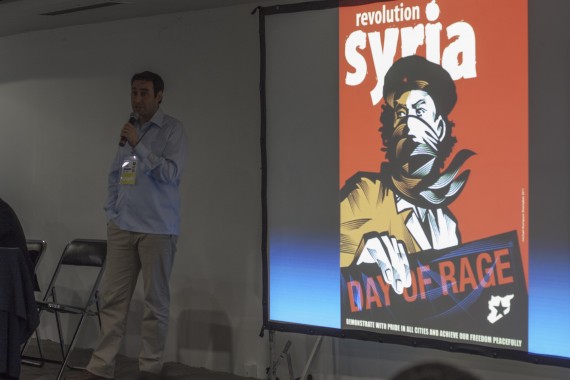
The young Syro-Brazilian Hames family. Photo used with Rami's permission
Global Voices volunteer authors and translators bring you stories and portraits from all over world. But interestingly, everyone of these volunteers have a story of his or her own worthy to be told.
Rami Alhames [1] is one of these volunteers. He describes himself in his Global Voices profile as a Syrian in Brazil, but there is much more to this prolific contributor. A polyglot, he writes and translates into Arabic [2], English [3] and Portuguese [4]. He has also his own blog [5] and he is very active on Twitter [6]. He is also an engineer and a father of two young toddlers.
I chatted with him this summer during the World Cup fever that gripped Brazil.
Global Voices (GV): Tell us a bit about yourself and how you joined GV.
Rami Alhames (RA): I'm a Syrian mechanical engineer who lived and worked in four middle east countries before losing the job in Bahrain in 2011 and forced to cross oceans with a 5 months pregnant Brazilian/Syrian wife to far south America largest country. I came to know GV when I googled Amira's [7] name (MENA editor) who is a friend of mine. However, in Brazil and during my unemployment period I joined GV em Português to enrich Brazilian vocabulary, then I found myself an author, translator and co-editor in GVinArabic.
GV: We know that Syrians are well established in Brazil since hundreds of years ago. It slowed down in the last decades of the 20th century. What can you tell us about your experience? How similar and how different are Brazil and Syria?
RA: The first Syrians immigrants [8] arrived Brazil and South America in the early 19th century and there was a second wave [9] after the WWI. They were called Turks because they were holding Turkish passports. As a new arrival, I met the third generation of these immigrants; the young Arabs are proud of their roots, though they don't know Arabic but its food names. In Syria you can find a stone from 3000 A.D, while Brazil is considered a “country of the future” where you won't find this ancient history. Brazil is very liberated country in human rights, politics and democracy. Syria is closer with its oriental culture and family bonds where forbidden slogans chase you all the time.
GV: While Brazil is a pioneer in Internet rights and freedom, Syria is infamously known for being one of the worst Internet enemies. What do you think Syrian activists can or need to do in order to make a breakthrough?
RA: Yes, Brazil is ahead of many first world nations who establish good rules of Internet freedom which didn't come from vacuum. Syrian activists revealed their creativity during the Syrian revolution but they can still learn more from Brazilians rights defenders how to use their intelligence in fighting against the surveillance by the Syrian regime which used the Internet as device to gag and detain the peaceful protests. I'm a supporter of peaceful online anti-government tactics that won't risk lives of people. GV has written a bunch of articles and mentioned many good practices in this regard.
GV: What are the views of the Syrian diaspora in Brazil on what is happening in their native land? Are they as divided as Syrians are internally? Is there an organized movement, especially when it comes to channeling humanitarian aid and assistance?
RA: Actually, Syrians in Brazil are well divided between anti- and pro-Assad government. While you find people who are defending the bombarding of the government in name of “war against terrorists,” very limited offers went public due to lack of media coverage that plays a significant role to bring the public awareness. Moreover, majority of Brazilians think of “Middle East” conflicts as a source of problems that never end, therefore, they're careless.
GV: This year, all eyes seem to be on Brazil because it hosted the World Cup and the NetMundial meeting on Internet governance. What does that in your opinion mean for the country?
RA: While NetMundial [10]is considered a gain and pride on international levels toward human rights and technology, the World Cup didn't go as smooth as the Brazilian government wanted it to be. From projects delays, collapsed constructions, and protests in the streets where people wanted to express their objection to the corruption that the government and FIFA want to hide beyond the popular game, almost a religion in Brazil. Not all Brazilians are blind football fanatics who forgive and forget the white elephants brought by the greedy politicians.
GV: What are some of your favorites?
RA: I love Gabriel Garcia Marquez and his “One Hundred Years of Solitude.” Muhammad Al Maghut is also among my favorite authors. I listen to Fairouz and admire the oriental music as much as I love the jazz of Frank Sinatra. Pizza is my favorite and its country Italy is my World Cup team that I support. I find myself traveling through the Lord of the Rings world and enjoy every movie comes through.
